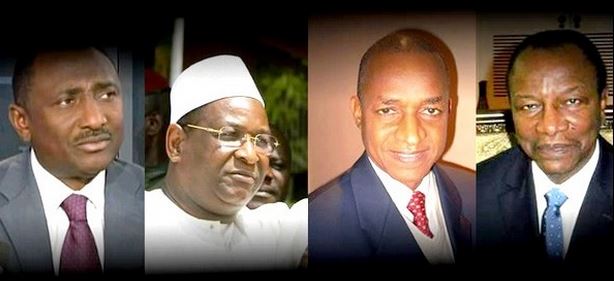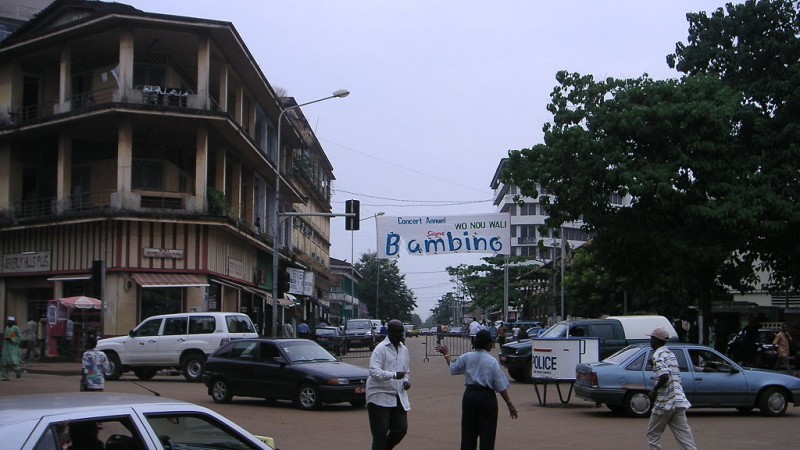Ahead of presidential elections later this year, the leaders of the Guinean republican opposition met in Paris on 22 and 23 March, where they declared that they are taking steps to stifle the “dictatorship” which is “emerging” in Guinea.
The opposition had already raised a few flags regarding the transparency of the voting electoral lists. In Paris, the three opposition leaders, Cellou Dalein Diallo, Sidya Touré and Lansana Koyauté, accompanied by Bah Oury, Hadja Tété Nabé and Baidy Aribot, reviewed President Alpha Condé's four years in office.
In addition to some aspects of his rule that the opposition called detrimental to the country, their assessment mostly accused the president of “repeated violations” of the constitution:
La gouvernance d’Alpha CONDE s’est illustrée depuis son installation comme Chef de l’État guinéen par un mépris total de l’Autorité de la loi et une violation systématique des dispositifs de la Constitution fondant les principes de l’État de droit.
Since his installation as Guinean Head of State, Alpha CONDE's governance has been characterised by a total contempt for the authority of law, and a systematic violation of the provisions of the constitution on which the principles of state law are founded.
The opposition blames Condé for being the president of his party only and “refusing” to set up and consolidate specific national constitutional institutions:
La déclaration de ses biens et patrimoines (cf article 36 ), la démission officielle de son poste de Président du RPG (article 38), la délivrance du message annuel de l’Etat de la nation (article 50), l’installation de la Haute Cour de Justice (articles 117 à 120) et les mises en place de la Cour Constitutionnelle et de la Cour des Comptes (article 160) ne sont pas effectives tout au long du mandat présidentiel.
The declaration of wealth and assets (cf article 36), the formal resignation from his position as President of the RPG [Rassemblement du Peuple Guinéen, the ruling political party in Guinea] (article 38), the delivery of the annual State of the Nation address (article 50), the installation of the High Court of Justice (articles 117 to 120), and the establishment of the Constitutional Court and the Court of Auditors (article 160) have not been put into effect during the presidential term.
In addition, they accused Condé of human rights violations and “interfering with the proceedings” of the National Independent Institute of Human Rights (INIDH), which has records of various assassinations taking place mainly at political demonstrations during his administration (although the opposition leaders didn't offer details of what those violations were).
In the eyes of the Guinean opposition, national laws are not the only ones which have been violated by Condé's government, particularly when it comes to the central authority's monitoring of decentralization. Condé's opponents point out that the installation of special delegates is illegal after they have been in place for longer than six months:
Ces attitudes politiciennes méconnaissent également l’article 2 point 2 du protocole de la CEDEAO sur la Démocratie et la Bonne gouvernance, signée et ratifiée par la Guinée, qui stipule ‘’les élections à tous les niveaux doivent avoir lieu aux dates et périodes fixées par la constitution et les lois électorales’’.
Equally, these political attitudes disregard article 2 point 2 of the CEDEAO [Economic Community of West African States] protocol on democracy and good governance, signed and ratified by Guinea, which stipulates “elections at all levels must take place on dates and in periods decreed by the constitution and electoral laws”.
According to the opposition, the government's violation of article 13 of the code on private and state-owned land has also discouraged foreign and Guinean investors from pursuing their activities in the country.
In light of their grievances with the president, opposition leaders released a statement on 6 March 2015, that outlined certain steps they would take. “In view of all of these abuses: M. Alpha CONDE loses all legitimacy to preside over Guinea's destiny,” the statement read. “His continuation in power would constitute a serious threat to peace and unity in Guinea and the stability of the sub-region. With regard to everything which has gone before, the opposition leaders have decided“:
De renforcer l’unité et la cohésion de l’opposition qui va s’atteler dès maintenant à l’élaboration d’un programme commun de gouvernement ;
De rentrer immédiatement en Guinée pour mener avec les autres partis politiques et toutes les forces vives du pays la lutte pour le respect de la Constitution, des lois de la République et des accords.
To reinforce the unity and cohesion of the opposition, which with immediate effect will commit to establishing a shared programme of government;
To return immediately to Guinea and, together with the other political parties and all the driving forces of the country, lead the battle to respect the constitution, treaties, and the laws of the Republic.
It remains to be seen if the opposition will follow through. A significant number of citizens have accused it of being too “flexible” in the face of a power, only concerned with safeguarding its own advantages.









1 comment